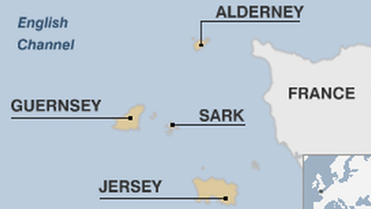
|
Jersey. Channel Islands, Great Britain / New Zealand
|
|
About Jersey |
|
Troy family history |
|
My family |
|
Our home |
|
Our horses & animals |
|
Morris Minors & Vmax |
|
E.Troy Ltd |
|
The occupation years |
|
Shuttlers Badminton |
|
Interesting snippets |
|
Contact us |
|
What's New |
|
Links |
|
Guest book comments |


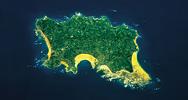
|
©Troy Family publications 2001-25 All rights reserved
|
|
Updated every 3 months . Last update Nov 2025
|
|
Jersey |
|
November 25 |
|
Website administrator Maurice R. Troy |
|
If you have any comments you would like to add about anything on this website please contact the website administrator.
maurice@troyfamily.co.uk |
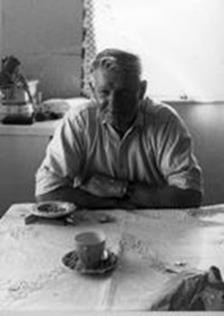
|
Note:
My new troyfamily co.nz
web site has started . |

|
NEWS FROM JERSEY( Reported in British papers)
PETROL SHORT, NO TEA, NO COAL
(From our own Correspondent)
BATH, Saturday.—Only doctors can get petrol in Nazi-occupied Jersey; tea supplies are exhausted; Guernsey has run out of coal. These facts—the first real news to leak from the islands since the ‘German occupation — are contained in a letter received by a Bath man whose mother and sister are living in Jersey. The letter was smuggled out of the island and reached Vancouver. From there it was transmitted to London and then to Bath. The writer states that Jersey tradesmen deliver their goods to central depots in open horse- drawn vans. A new air-raid shelter has been built on the site of the Sandringham Hotel. Furniture belonging to Lady Trent. and Lady Knott has been confiscated for the use of German troops stationed at Victoria College. Government House is’ now occupied by the Nazi commander-in-chief. The food situation is not serious, says the writer. Tea supplies are exhausted, but milk is available, and fishing is permitted within a mile and a half limit from the shore. Permits are required for lirnpets, crabs, sand-eels, etc. PARK CONCERTS Wireless sets were forbidden at first, but are now in use again. German bands give concerts in the parks, and there are free dances. Jersey is mostly used as a rest camp. The writer says that a large number of German planes have been shot down by the British. Major Antoine, Constable of St. Saviour, and 80 soldiers on leave when the Germans landed, were sent to French concentration camps. The letter states that Guernsey’s coal stock was estimated to last until February—this month. Trees have then to be felled to supply fuel. Fish is used for obtaining fats, Clothing and shoe repairs are rationed. Vegetables are grown in hot-houses, Sea water is evaporated for salt. |
|
Hunger hits Islands.
People left in the Channel Islands have no coal and food is severely rationed. They have no coffee or tea and are roasting rose and blackberry leaves to take the place of coffee. Lord Portsea who gave that news to the House of Lords yesterday suggested that the Government should send a ship to the Islands . The Duke of Devonshire replying for the Government said the position might changes in the future but there was no hope of doing anything at present. |
|
Targets Raids Occupied France 179 965 Holland 70 460 Belgium ...... 40 233 Norway 22 79 Denmark 7 16 Italy 32 47
In the Middle East our bombers have made 118 raids on Benghazi and 60 on Tripoli Harbour In addition, there have been isolated raids on the Channel Island airports of Jersey and Alderney. |
|
RAIL CONCESSION TO SERVICEMEN’S WIVES (England) From to-day wives of soldiers, sailors and airmen will be able, by producing their allowance books at railway booking offices to obtain third-class tickets, single or return, for any station at approximately half the ordinary fare. The new concession also covers children under 16 travelling with their mothers. |
|
Found hand written amongst some of our old occupation papers.
God is our refuge Don’t be afraid He will be with you All through the raid When bombs are falling And danger is near He will be with you until The all clear. (Val’s Grandmother) |
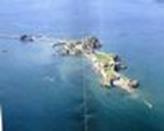
|
The well fortified Elizabeth Castle in St Aubins bay. |
|
Richard Troy 1899-1964. My father. He lived through two World Wars. |






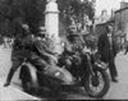




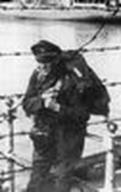



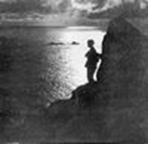















|
German sentry guarding the coast around Jersey |
|
German officer in chauffeur driven car crossing King St being directed by a British policeman during the occupation. Ideal propaganda for Hitler. |
|
The first American plane to land on Jersey since war began landed on the 11thMay 1945, it was a Stinson L5 |
|
The only fuel left being gathered by children during the bad years |
|
German prisoners making their way along Victoria Avenue to the landing craft on the beach. |
|
German soldiers being strip searched by the British |
|
The first Germans to leave on May 8th 1945 |
|
German officer POW’s being shipped out |
|
A seconded French Renault tank that the Germans used is there being used to crush scrap metal to clear up |
|
After most of the 26000 German officers and soldiers were removed these 3200 remained behind as prisoners to help clear mines and tidy up. |
|
Vice Admiral Hueffmeier took over from Graf Von Schmettow on 28th Feb 1945 which was a blow for the Islanders. He was known as a “rabid Nazi” |
|
General Von Schmettow takes the salute at a march past in the Parade in 1943 |
|
Above and below crowds on Victoria pier watching the Bailiff Alexander Coutanche and the British navy escorting the German officers out to HNS Beagle |
|
German prisoners clearing under the watchful eyes of the British |
|
German officer prisoner leaving at the harbour. |
|
British troops led by Col Robinson marching around the weighbridge. Above and below is the prisoners being rounded up in front of the Southampton hotel Jersey |
|
A German funeral during the Occupation at St Brelade |
|
1st July 1940 the Germans arrived and took over the Island. |
|
British landing craft with German prisoners, they were shipped to internment camps in England. |
|
Right, bedraggled Germans are marched along Commercial buildings by British troops, some trying to hide their faces. |
|
British landing craft in St Aubins Bay. |
|
The joy of liberation at the Pomme D’Or hotel at the weighbridge |
|
The crowds watching the troops setting up communications on Liberation day at West Park. |
|
A German gunner on motorbike and side car in the Parade St Helier during the Occupation. |
|
Left the crowds watching the SS Vega berth at the Albert Quay with much needed Red Cross rations. Facing starvation as 1944 drew to a close their prayers were answered as at 5.45pm on Sat 30th Dec Red Cross food parcels arrived after being dispatched from Lisbon on Dec 7th. |
|
A lone sentry |
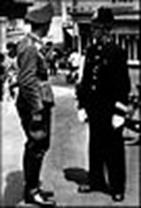
|
Jersey, whose in charge? |
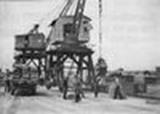
|
Bob Troy supervising his Dockers in 1946 on the New North Quay in loading the first shipment of potatoes bound for the British troops in Germany |

|
Loading prize Jersey cows in 1938 at Springfield showground not long before the German occupation |
|
EXTRACT FROM THE JERSEY EVENING POST EDITION OF THE 29TH JUNE 1940
ACCOUNT OF THE BOMBING OF ST. HELIER HARBOUR BY MR. R.K. TROY
On the Albert Pier
What happened on the Albert Pier is best described by two men who were actually present, Mr. R.K. Troy, the Stevedore in charge of the loading of a ship, and Mr. J.A. Laurens, of 17 Pomona Road, who was working with him.
“We saw machines coming over”, said Mr. Troy, “but we took little notice at first, for we have seen so many German planes lately. Suddenly I heard machine-gunning and realised that they were attacking and that we were the target. I shouted to the men to take cover and I myself got under a crane, and only then realised that there was little or no shelter there, as the crane was one of the high gantry type. The men scattered all over the place, some under lorries and others under stacks of sacks. Coming over as they did from the Fort we had no protection for the high wall of the walk was unfortunately behind us. Mr. Truscott and another crane man were hit by machine-gun bullets and others of my gang, Messrs. W. Tirel, Connors and Wilson, were also wounded, Mr. Tirel having his toes completely shot off.
“A bomb which burst near the railway sheds was also dropped, and then I heard that Mr. Fallis had been killed. He had come out of his quarters and as the machine went over he laid down under the lee of the S.R. Passenger shed, but a splinter of the bomb hit him as he crouched down and terribly mangled him. I ran over to his assistance, but I soon saw that there was nothing to be done for Mr. Fallis, so I ran back to the other injured men to try and get them to hospital, but neither my car nor the lorries on the pier would start, every one of them had been hit and put out of action. The ambulance then came down and the injured were taken to the General Hospital, and here I must say a good word for the work of the police, ambulance drivers and A.R.P. men, who worked splendidly and calmly.
“After the first raid had occurred, I called out to the men who were working with me, “what about making another start?” and several of them agreed but the planes came over again, this time from the direction of St. Aubin’s Bay and did some more machine-gunning. I saw it was hopeless and told the men to make their way up the pier”.
Mr. Laurens bore out Mr. Troy’s statement “I took cover under a lorry” he said and a fellow alongside me was hit. As we went up the pier after the second raid they started machine-gunning again and Mr. Troy and I who were then alone, lay down alongside the promenade wall and I can tell you we hugged it close.”
|
|
More to come…. |
|
When the power of love overcomes the love of power, we shall have peace. |
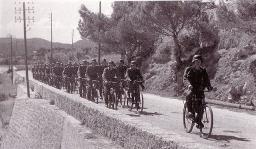
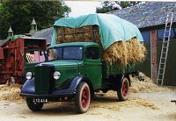
|
Left is a 1948 Morris Commercial. Typical scene in Jersey after the occupation was over |
|
Copy of my father’s letter written at the very end of the German Occupation of Jersey to his brother-in-law in the England. (No communication was had for five years.)
Written in pencil as no ink on the Island of Jersey.
Click on link and scroll to bottom of the page. Letter |
